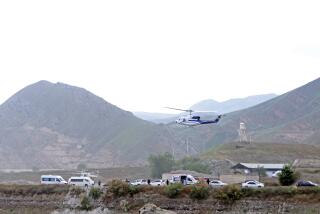Sweat and Tears Top Nutwood Levee, but the River Wins : Disaster: Endless days of hard work fail to hold back the Illinois River. Water cascades into homes and fields, wrecking families’ futures.
For a week, Bob Branham, the water pump station operator in this tiny farming community, slept in a life jacket, anticipating the moment when the Illinois River would burst its levee.
As it turned out, he was standing on the levee itself Sunday when the river smashed through a large section of the barrier, defeating efforts of hundreds of residents, volunteers, National Guardsmen and inmates.
They had been working 18-hour days for two weeks to try to save the town of Nutwood and the farmland between it and the river by building up a 2 1/2-foot barrier of sandbags atop the 12- to 15-foot-high dirt levee.
“I’ve never seen anything like it,” said Branham, 69, who lives right next to the river. “It had been a very big effort. Nobody could stop it.”
Nutwood is north of St. Louis, above the new confluence of the Mississippi and Missouri rivers. The Illinois River, a tributary of the Mississippi, has reached its highest point on record. In Nutwood, it crested early Sunday, not long before the Mississippi River crested at St. Louis.
By Sunday afternoon, dark green and brown water was cascading over the wall like a 100-foot-wide waterfall. It was swamping 11,200 acres along an eight-foot stretch of the river, said Stan Ebersohl, of the Army Corps of Engineers.
“This area is all the flood plain for the river,” said Gen. Paul Gebhart, commander of 550 National Guardsmen up and down the river. “Man had reclaimed all this land for farms, and now the river has taken it back.”
For the residents of Nutwood and the outsiders who had been toiling for many days to try to keep the levee intact, Sunday was a day of great disappointment.
“It’s just depressing,” said Eric Gettings, 24, who was covered in dirt and sweat after his 12th day of filling and hauling sandbags. “We’ve been working so hard. We could have held it if the water had stayed where it was yesterday, but it just kept rising. There was nothing we could have done.”
For Gettings’ brother Brett, the failure of the levee means his home and at least 1,200 acres of his soon-to-be mature corn and soybeans is under three to four feet of water.
The soil around Nutwood is some of the most fertile anywhere, according to Ebersohl. And this year’s corn crop was the best one Gettings had ever planted, he said. Now the dark green tops of his cornstalks stick out a couple feet from the water.
“It’s like the big one that got away,” Brett Gettings said. “I think it was going to be an unbelievable crop. It was just too good to be true.”
When the waters covered his land, he lost $300,000 in income, he said.
“Imagine if you worked all year and they said, ‘Sorry, no paycheck,’ ” he said. “Then imagine that you had already spent half of that money.”
He estimates that it will be months before he will be able to move back into his house. His biggest fear is that the fields will not be dry enough by next year to plant.
But Gettings and the other farmers in this area say they would not consider leaving their fertile corner of the world.
“I love this land,” said Joe Czaia, 41, who farms an area south of Nutwood that is not protected by the levee and has been under water for two weeks. “It’s been in my family since 1887.
“I can’t give it up,” he added with tears brimming in his eyes. “I won’t quit. It’s part of me.”
Upstream in the town of Hardin, the Illinois River seemed to have defeated all efforts to keep its waters back. From the air, walls of sandbags could be seen under the water, which flowed freely into the small town, submerging houses up to the rooftops.
“This is monumental,” Ebersohl said as he viewed the sunken crops, silos, restaurants, homes and other structures from a helicopter.
Along the levee upstream from Nutwood, small groups of people were furiously working to build up existing walls of sandbags to keep it from bursting and flooding more fields.
The people of this rural area were full of gratitude for the outsiders who came in to help, especially for the 30 inmates from a nearby prison who had been giving their all to fight the river.
“Some of these guys apologized to me for losing the levee,” said Jerry Birch, 60, a retired steelworker who was working with the inmates trying to shore up the levee. “The National Guard is getting all the credit, but those guys right there have done the hard work.”
More to Read
Start your day right
Sign up for Essential California for news, features and recommendations from the L.A. Times and beyond in your inbox six days a week.
You may occasionally receive promotional content from the Los Angeles Times.






